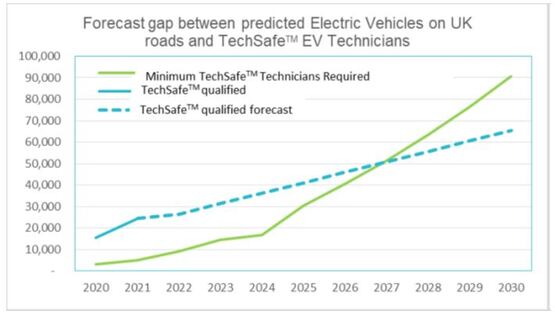The number of electric vehicle (EV) trained technicians has increased 4.5% since 2020 but is not enough to bridge the gap before 2030, the Institute of the Motoring Industry (IMI), has warned.
Analysis by the IMI has revealed that only 11% of technicians in the UK are qualified to work safely on EVs.
The IMI said it fears a “ticking time bomb” of consumer confidence, as motorists struggle to find appropriately qualified technicians and is renewing its call for greater fiscal support.
Steve Nash, chief executive officer at the IMI, said: “Of course, it is welcome news that the number of EV qualified technicians is growing, yet the skilled EV workforce is not keeping up with sales of BEV, PHEV and HEV vehicles.
“Despite government’s positive commitments on charging infrastructure in last month’s EV strategic review, if the workforce is not quickly and efficiently up-skilled, we face the very real problem of lack of technicians available to keep EV’s on the road and able to use this enhanced network."
 According to the IMI, there could be a shortfall of 25,100 qualified technicians and it predicts the shortage could materialise as soon as 2027.
According to the IMI, there could be a shortfall of 25,100 qualified technicians and it predicts the shortage could materialise as soon as 2027.
The IMI is renewing its call for a £15 million boost to help get 75,000 more technicians ‘EV ready’.
Nash added: “Nobody is suggesting that getting back on track with technician training post-pandemic has been easy. While manufacturers and their franchised dealers are committed to EV training, lack of funding means independents risk being left out in the cold and these skills premium risks consumer choice being restricted and EV servicing costs rising.
“If the Government wants to meet its own decarbonisation targets it must be willing to bolster funding. No matter how impressive an EV infrastructure the UK might boast, the Government must stop its ostrich like behaviour regarding the widening skills gap, pull its head firmly out of the sand and invest in a skilled workforce, or risk failing to meet its 2030 ambitions.
“The automotive industry is a tremendously exciting tech-led sector to work in. Fiscal support would not only help re-skill existing technicians, but also help attract school leavers and career changers into a sector which has an increasingly diverse attitude to recruitment.”
> Interested in comparing electric vehicle data? Check out our EV tool.
> Interested in ensuring the efficient use of EVs. Check out our dedicated editorial sections: Insight & policy | EV news | Charging & infrastructure | Costs & incentives | Benefit-in-kind | EV case studies | EV road tests




















Login to comment
Comments
No comments have been made yet.